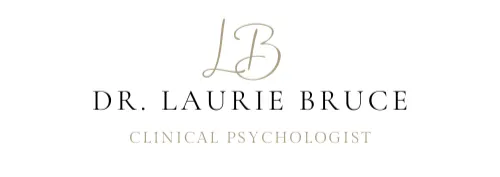A Little Bit About Me
About Dr. Laurie Bruce
About Dr. Laurie Bruce
Dr. Laurie Bruce is a licensed clinical psychologist with a Doctorate in Clinical Psychology, earned in 2000, and over two decades of experience working with high-achieving individuals navigating complexity, pressure, and responsibility at the highest levels.
Her clinical foundation is rooted in Dialectical Behavior Therapy (DBT)—an evidence-based approach that integrates cognitive and behavioral psychology with Eastern mindfulness practices. This combination allows Dr. Bruce to support clients not only in managing symptoms, but in developing the internal regulation, clarity, and resilience required for sustained leadership and decision-making.
Mindfulness is central to her work. For high-performing women in business, mindfulness is not a wellness trend—it is a strategic skill. When leaders develop awareness of their thoughts, emotional responses, and physiological signals, they gain greater control over stress, sharper discernment, and the ability to lead with steadiness rather than reactivity. Research consistently shows that mindfulness practices reduce anxiety and depression while increasing clarity, presence, and emotional intelligence—critical capacities for executive performance.
Psychedelic-Assisted Psychotherapy & Conscious Leadership
Dr. Bruce is also a Certified Psychedelic-Assisted Psychotherapist, having completed a year-long intensive training through the Integrative Psychiatry Institute. She brings a deeply grounded, ethical, and clinical lens to this work, supporting individuals working through trauma, mood and anxiety disorders, and deeper personal and spiritual development.
While psychedelic-assisted therapy can be transformative, Dr. Bruce emphasizes that it must be approached with discernment, preparation, and professional guidance. She is a strong advocate for safe, legal, and informed use—particularly for leaders whose nervous systems, responsibilities, and visibility require stability and integration, not destabilization.
Working With High-Performing Women & Executives
Throughout her career, Dr. Bruce has worked with thousands of individuals, including executives, founders, and women in positions of influence. She understands the unique challenges faced by high-performing women: chronic pressure, over-functioning, internalized expectations, and the belief that worth is tied to output, performance, or caretaking.
Many of the women Dr. Bruce works with are outwardly successful yet inwardly depleted—carrying unexamined narratives that quietly erode well-being and fulfillment. Her work focuses on helping clients identify and dismantle these internalized messages, while developing a grounded relationship with themselves that supports both personal health and professional longevity.
True success, in Dr. Bruce’s view, is not built on self-sacrifice. It is built on self-trust, regulation, and the ability to lead from a centered, integrated place.
Mindfulness Coaching & Advisory Work
In addition to clinical psychotherapy, Dr. Bruce offers mindfulness-based coaching and advisory support for women in leadership who are not seeking therapy but desire a confidential, high-level space to refine how they lead, decide, and sustain themselves.
This work is particularly well-suited for executives, entrepreneurs, and founders who want:
Greater emotional regulation under pressure
Clearer decision-making without burnout
Improved leadership presence and authority
A grounded, practical approach to mindfulness that integrates seamlessly into demanding lives
Dr. Bruce’s coaching work bridges psychological insight with real-world leadership demands, offering women a way to operate at a high level without disconnecting from themselves.
Choosing the Right Support
Dr. Bruce believes it is essential for individuals—especially those in positions of influence—to be discerning when choosing therapeutic or coaching support. Not all providers are equally trained, ethical, or effective. Poorly matched care can be unhelpful at best and harmful at worst.
Through her work and educational resources, Dr. Bruce helps women understand what to look for in a therapist or coach, how therapy differs from coaching, and how to recognize red flags—so they can make informed, empowered choices as they invest in their well-being and leadership capacity.
Learn More & Stay Connected
Subscribe to receive newsletters and curated resources designed for thoughtful, high-performing women seeking depth, clarity, and sustainable success. You may unsubscribe at any time. Your information will never be sold or shared.
